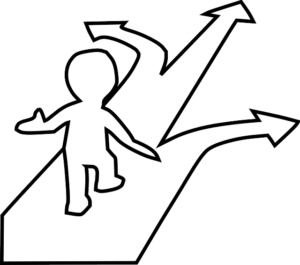 For God is not the author of confusion but of peace . . . (1 Cor. 14:33)
For God is not the author of confusion but of peace . . . (1 Cor. 14:33)
I recently started attending Sunday school at a new church. It’s like a small city, and for this woman who grew up in a town of about 200 people, it can be overwhelming to walk into a building with more than 20 times that number of people milling about at one time.
I’ve attended the class only a handful of times, so I’m still trying to figure out the layout. On my second trip there, I went in a different door and asked the volunteer if I could get to where I needed to be from that entryway. She directed me around the corner and down a hallway that took me to the atrium that connected to the Sunday school classroom hallway. Confused yet? If not, maybe I need to take you with me next time.
When I left, I decided to go out the same way. I was confident I could retrace my steps—walk out of the Sunday school classroom and to the atrium where I would hang a right into the hallway that would take me to the entryway through which I had entered.
You know what happened next, right? I got lost, of course. I followed what I thought was the exact same path, and somehow, I ended up on the opposite side of the building from where I had entered only an hour and a half earlier.
Upon exiting, I expected to see the parking lot with my car. Instead, nothing looked familiar. Tamping down my confusion, I decided to follow the crowd. Surely, if I circled the church, I would find the parking lot with my car at some point. If nothing else, walking would be good exercise, right?
I strolled by the kids’ area and then the youth area. I kept walking. And walking. At this point, I’m fighting down a bit of panic. I’m at the church, which means I drove there, so my car is out there somewhere. Right?
Finally, I spotted something familiar—the entryway I had used the week before (maybe—at this point, who knows?) and definitely the correct parking lot. Whew!
Such directional confusion isn’t uncommon for me. As a teenager, when I first started driving in Oklahoma City and for many years after, I would panic when I turned down the wrong road or took the wrong exit. One time, my mom and I went to Oklahoma City for a women’s church event, and I missed my exit. Since I was on a busy highway, I wasn’t sure how to turn around. I started to panic, but my mom very calmly informed there was an exit up ahead that I could take. Then, when we were out of heavy traffic, we could figure out where we were going. Even if we went a little out of our way, it wasn’t a problem—we weren’t in a hurry, and who knew what kind of treasures we might find along the scenic route?
I’ve always remembered that advice, and it works well for life as well as driving. We make a multitude of decisions every day—some big, most small. Big decisions, such as choosing a major in college or deciding to run my own business, caused analysis paralysis and major upheaval for me. I’ve delayed acting on things I knew I should do because I couldn’t see the path ahead clearly.
Small decisions, made over and over every day, form the basis of who we are. When we make a decision that takes us down a different path than we intended—or the road splits unexpectedly, causing us to make a quick decision about which way to go—we may lose our way. Or so we think. Even when we take the road less traveled—even when our circumstances are scary and unfamiliar—even when we don’t know how we got to where we are—if we hold tightly to God’s hand, we will find our way back to the God we know and who knows us.
Dear Jesus, thank you for staying close to us when we feel lost and confused. Help us as we make decisions and when life takes an unexpected turn through unfamiliar territory. Help us cling tightly to you through it all. Amen.
When I grew up we used road maps when traveling. My mother was not good at reading them, so this task often fell to me. Yet according to mother I was not good at navigating how to behave around groups of people. I wasn’t trying to do the wrong things, but was not sensitive to the “unwritten” rules of behavior.
I am one of the people the opposite problem. I’ve deal easily with missing an exit (or it being closed for repairs as frequently occurs in Oklahoma) but encountering a group of new people is unnerving.
I agree that meeting new people is unnerving. I do wish I had your ability to deal easily with missing an exit! I’m getting better at it because, as you pointed out, road construction is a frequent challenge of navigating the roads in Oklahoma.